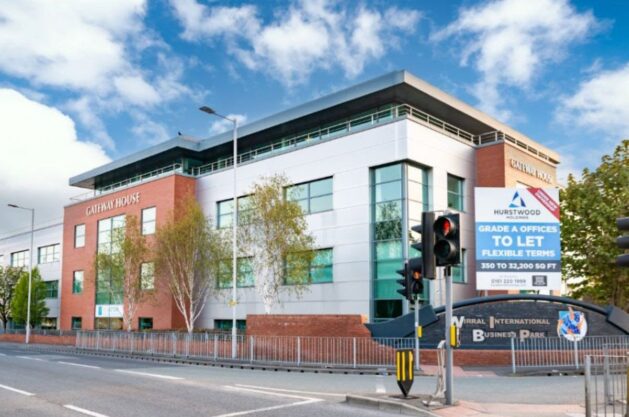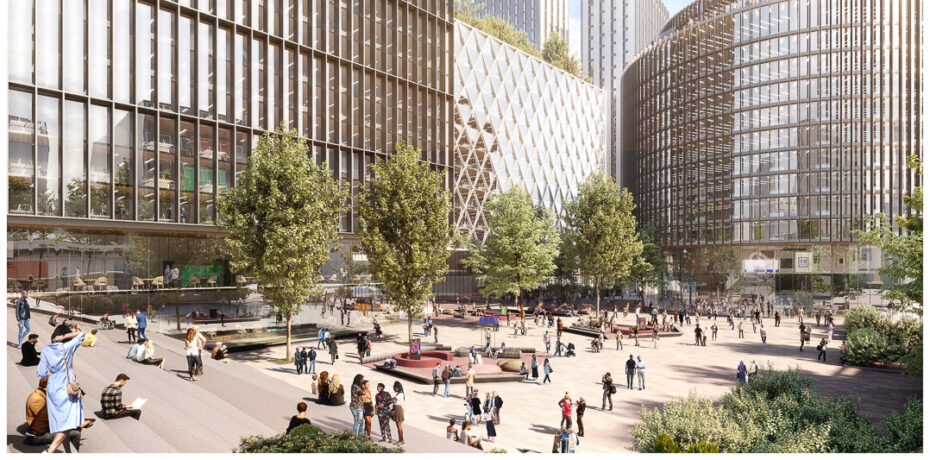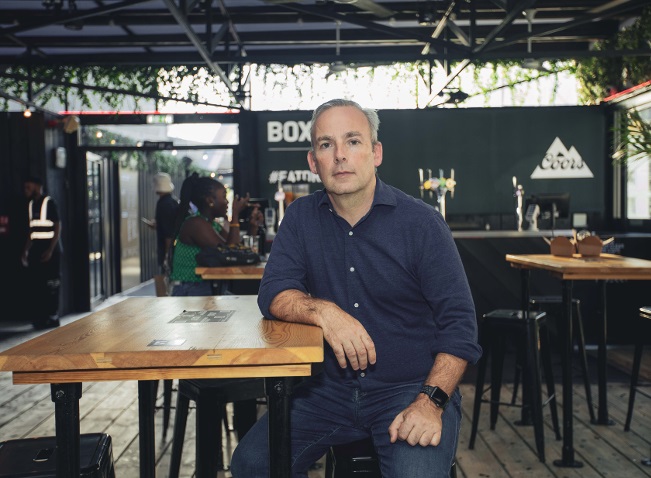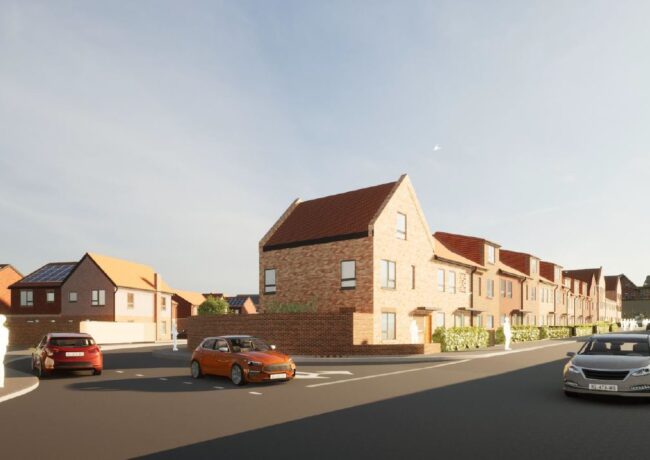The Subplot
The Subplot | Business parks, Neville and Flintoff
Welcome to The Subplot, your regular slice of commentary on the North West business and property market from Place North West.
THIS WEEK
- A Tale of Two Sportsmen: Gary Neville and Andrew Flintoff moved into Manchester real estate. How’s it going so far?
- Unkillable: the landlords of the North West’s suburban offices have had a difficult couple of decades. It taught them lessons that are now paying off.
- Is that it? The selection of a development partner for the £1.5bn ID Manchester scheme is nearly complete. But where did the big-name bidders go?

A TALE OF TWO SPORTSMEN
 Who shoots, who scores?
Who shoots, who scores?
Gary Neville’s £200m St Michael’s scheme has just five weeks to start on site, otherwise its planning consent will expire. Logik Developments, chaired by cricketer Andrew Flintoff, is on the brink of a deal to unlock a 1m sq ft scheme. Both have open goals, will they score?
Timing is everything in property and in sport. The partnership behind the £200m St Michael’s scheme has to move fast to prevent the expiry of hard-won planning consent. Meanwhile, last week’s disclosure that $600m Canadian real estate giant Brookfield Asset Management was close to agreeing to support up to 1m sq ft of commercial development and student housing at Upper Brook Street, close to Manchester University, was poorly timed for Logik, the business Flintoff co-owns with director Neil Spencer and Tony Bhatti. As the economy unlocks, which will prove quickest on their feet?
Gary’s team
Gary Neville’s Relentless Holdings paid its shareholders (Gary and Emma Neville) a dividend, according to accounts for the year to 31 December 2019: £425,000, up from £40,000 the year before. They probably felt they deserved it after the extreme grief involved in winning planning consent for the £200m St Michael’s office, hotel and residential development at Jacksons Row and Bootle Street in Manchester. Now they face another problem: the scheme’s planning consent is now just five weeks from expiring.
Five weeks away
Consent was granted in June 2018, so work must commence before 20 June 2021 to avoid it lapsing. Perhaps this explains paperwork, recently lodged with Manchester City Council, paving the way for the demolition of the kitchen extension at the rear of the Sir Ralph Abercrombie pub. This might count as the “material operation” that adds up to commencement of a kind that would satisfy both city planners and section 56(4) of the Town & Country Planning Act 1990. There is also an indication that preliminary studies of ground contamination are imminent.
The clock is ticking
Progress on St Michael’s has not been electric. In January 2020 it was disclosed that Laing O’Rourke would be construction manager (replacing Beijing Construction & Engineering). Recently filed planning paperwork suggests a slowdown in aspirations, including permission “to defer pre-commencement compliance triggers, to introduce phasing.” Deferring some paperwork until later “will make it easier to start on site more quickly given the time remaining on the consent,” a supporting letter said, adding that phasing was likely. Subplot approached Relentless, architect Hodder & Partners, Zerum, and Laing O’Rouke for more information, but only Laing replied, declining to answer questions — including one asking whether it was still involved — and referring Subplot back to Relentless.
Deep pockets
What we do know is that the past few years have required deep pockets from the shareholders of Relentless Investments (its parent company is Relentless Holdings), which lent £2.98m interest-free to Jacksons Row Developments, one of the participants in the St Michael’s Partnership along with Manchester City Council and Singaporean funder Rowsley. Relentless Investments also lent to Neville’s Zerum planning and construction consultancy entities, but since Zerum’s parent is also Relentless Holdings, and since Zerum is advising on the two recent planning applications related to the St Michael’s project, presumably that money goes round in a circle.
Directorships
Meantime, although Ryan Giggs is no longer a director of Jacksons Row Developments, he is still a co-owner with Neville and Brendan Flood via his company RGJR Ltd. Neville and Giggs remain joint shareholders of another business called (rather sweetly) Alexander Joseph Ltd, Alexander and Joseph being their respective middle names.
Doing the sums
Fellow developers have long been baffled by St Michael’s. Some point to the city council’s enthusiastic backing (which dates from long ago, during the site assembly process) and say this explains everything. A Candy Brothers’ style super-deluxe apartment scheme would show Manchester could play in the same league as W1. Because the council wanted it, people came forward to do it. But the maths were always going to be a challenge. “Fundamentally, everyone knows that it never really stacked up financially,” Subplot was told by one big name. “Development is too all-consuming for it to be successful if you’re trying to bring a scheme forward purely on the back of your celebrity status.”
Uppers not downers
So how are things going over at Team Flintoff? Discussions with landowners and the council about the Upper Brook Street site are almost complete, but not quite. A planning application is still at least six months away. The core site is co-owned by Logik and McLaren Property (which already has a relationship with Brookfield via its Student Roost brand). By clustering council-owned land and several car dealerships (Williams, Citroen) you turn a low-density disappointment into a high-density landmark. This is exactly what Manchester City Council envisaged in its £2bn growth strategy for the Upper Brook Street area, where the site is identified for mixed-use commercial development of more than 1m sq ft up to 10 storeys high. It is one of three Logik schemes currently in progress.
More offices
Logik’s plans for Baring Street in Manchester’s emerging Mayfield district include a 12-storey block containing 215,000 sq ft of offices and a 170,000 sq ft hotel. The project would have moved faster if the pandemic hadn’t scared bank lenders out of the speculative funding market. Market chatter says a funding deal fell out of bed but the hunt is back on. A deal with a hotel operator is also believed to be close. Logik director Neil Spencer told Subplot that a concordat with the Mayfield Partnership to allow the two developers’ schemes to mesh nicely, is now being finalised.
And some flats
In Arundel Street, a residential development (23 storeys, 335 apartments) had a rocky journey through the planning system. Subsidiaries of the High Street Group, the Newcastle-based developer which agreed to a joint venture with Logik in January, has also been having a torrid time, as Place North West reported. Sinclair says the £100m scheme is not touched by these troubles. He says: “We have funding agreed and hope to be on site in Q3 2021. We already have a contractor involved.”
The logic of Logik
Maybe the way Logik uses the capital at its disposal is significant. Says Sinclair: “We don’t option, we own, so we are ready to go.” Logik accounts for the year to 31 March 2020, the latest available, show the directors paid themselves £108,000 in dividends that year.
Conclusion: Keeping your eye on the ball is a key skill.
DRIVING THE WEEK
 Business parks: everything is rosy
Business parks: everything is rosy
The landlords of the North West’s suburban offices are making a virtue of necessity by offering super-short leases and lots of flexibility. It costs, but it is keeping the cash flowing.
“Every bursted bubble has a glory! Each abysmal failure makes a point!” sung Grandpa Potts in Chitty Chitty Bang Bang, one of the films you’ll be watching as the rain pours down during the next Bank Holiday Monday. The Sherman Brothers lyrics are instructive: up from the ashes, grow the roses of success. This is a message the region’s suburban office landlords have taken to heart in a way that city centre landlords have so far failed to. As a result, the business parks are flush with springtime blooms.
450,000 reasons to be happy
Let’s not get carried away. Demand is nothing like it was pre-Covid-19, but the best estimates suggest current live (real) requirements of about 150,000 sq ft in the 5,000-20,000 sq ft category, and perhaps as much again for suites of 5,000 sq ft or less. Sitting on top of all this, like mulch, is the either / or demand, amounting to another 150,000 sq ft. As Chris Lloyd, investment director at Glenbrook, explains: “There’s a lot of occupiers looking at both out-of-town and the city centres, and there’s a big job to be done convincing them on the right location.”
Cash is king
Incentives on longer leases have moved out: a five-year lease might have attracted six-to-nine months rent-free in 2019, but would get nine-to-12 months today. That doesn’t really matter because hardly anyone is signing five-year leases. The smartest among them actually don’t want them too, if they come at that price. Why hand over (in cash, maybe) £75,000 up front on a five-year lease, not knowing whether the occupier will be around to pay up all the way to year five? You’d be mad. Much better to sign them for 12 months, with no rent free. The landlord gets income from day one and a good chance the tenant will roll over into another 12 months at the end (particularly, say landlords, if they paid for their own furniture and don’t fancy the faff of moving it).
Pay me now
Paul Coulter, head of asset management at Squarestone, presides over suburban offices in Manchester and Merseyside. He explains: “The thing about flexible deals is there’s zero rent free. We’re getting the money today. Would you rather have 23,000 sq ft empty for a year whilst you wait for someone to sign a five-plus year deal, or not? Because if you wait you will be waiting for your money for 24 months. We’re not waiting, we’re getting income from day one.”
You want it, you have it
Landlords are chucking out the old certainties and embracing the kind of property-as-a-service model long talked about, but rarely seen. Floor by floor the smarter landlords are converting empty offices into flexible workspace, adding more as each floor fills up. Around 10-15% of floorspace seems to be heading in this direction.
Landlords heart tenants
At the same time, landlords are adding amenities: if the aim is to grow deals, this is their fertiliser. “It used to be all about lifts, loos and views, but it’s not any more,” said one agent. “Now it is all about community.” Look, for instance, at the former DeVere Hotel at Cheadle Royal, now in the midst of conversion to a workspace-type club, a 37,000 sq ft transformation thanks to Wilmslow-based Aus-Bore. It opens this autumn.
It’s all about maths
Landlords are throwing everything at potential deals, including desks and chairs. Squarestone, for instance, is offering superflex deals which, in one case, meant 23,000 sq ft let, fully fitted out, for 18 months. It is also happily carving up floors into whatever size occupiers want: a 10,000 sq ft floor suddenly becomes a 6,000 sq ft suite because that’s what the occupier wanted. The gamble is the other 4,000 sq ft will look after itself, eventually, and that 6,000 sq ft in the hand is worth a lot more than 10,000 sq ft in the bush.
Comatose
“If they don’t get moving on flexible space, then the sleepier landlords will miss the boat,” says James Dickinson, director at Canning O’Neill. “It doesn’t necessarily have to be a serviced offer, but they do need to carve up suites, create collaborative areas, call it managed workspace and maybe let it on 12-24 month leases, but certainly not five years because people are not looking that far ahead. That’s what the market needs.”
Freehold options
This is not magic. The business parks are doing well because their SME occupiers are faster moving, and less Covid-panicked, than the big corporates. The SMEs that have survived this far have cash. “The SMEs trousered their bounce back loans and that money may drive freehold demand in the way self-invested pension pots did a few years ago,” one wily old hand told Subplot. Landlords are finding ways to create 1,000 sq ft suites available for sale with the aim of meeting this demand, a smart move.
Happy bunnies
For now, suburban landlords can’t believe their luck. Hurstwood bought 31,000 sq ft Gateway House on Wirral’s Chester Road at an auction late last year for a net initial yield of 15%. The gamble on this under-valued building is paying off. “We’ve let 7,500 sq ft to six or seven new tenants, so the demand is definitely there,” says a jubilant Chloe Ellerby in the sales team at Hurstwood Holdings. You feel a similar vibe at Orbit Developments. “We are witnessing a change of tone in these conversations where opportunistic businesses with substantial growth plans and solid investor backing are emerging in the market for additional space,” says Adam Jackson, regional leasing director at Orbit, whose team is concluding 12,200 sq ft of deals at its Manchester Parkway estate, with another 4,000 sq ft deal on the way.
Conclusion: A tough couple of decades have taught suburban landlords how to survive. They are like the unkillable old rose in your front garden, the one that just won’t die despite everything. Their city centre peers, many of them delicate hothouse flowers, have some painful learning to do.
IN CASE YOU MISSED IT…
That sinking feeling
Peel L&P with Urban Splash and Bruntwood SciTech with London-based giant Stanhope are in the final run-off for the £1.5bn ID Manchester development, Place North West reported. The news is not lifting spirits.
The 26-acre ID Manchester scheme has been a long time coming. The University of Manchester paused the procurement process in 2019 saying it needed to complete “internal processes” before moving forward. Then, later that year, the scheme grew by 500,000 sq ft to 4m sq ft. suggesting the internal process was more of a re-think. Then along came coronavirus and the process of securing a development partner was postponed again. Now just two bidders are left.
Missing
The disappointment for property people is that the hoped-for list of stellar international players never materialised. Beijing Construction & Engineering partnering with Chinese mega developer TusPark didn’t make it very far, nor did Singapore giant Mapletree. Where are the giant well-funded American sci-tech developers? Nobody knows.
You had one job
That’s not quite true. Some people think they know, and they say the university overplayed its hand. A rather one-sided deal gave a lot to the university, less to the developers who were expected to make long-term commitments, and, as this dawned on the potential bidders, they dropped away.
Still standing
Eyes are also rolling at the depleted field. Peel is respected but does things its own way, which is often cautiously (see Subplot, 6 April). For Urban Splash this would be large, larger in fact than the 15-acre Royal William Yard in Plymouth. It signed its first development deal there in 2003 and today, 18 years later, it has just 215 apartments and 115,000 sq ft of workspace. On the other side, Stanhope had an earlier stab at a major Manchester project, reportedly bidding for NOMA in 2011. But the partnership with Bruntwood SciTech is untested.
The ID site is Manchester’s jewel. Observers are now wondering if it will sparkle any time soon.
The Subplot is brought to you in association with Cratus, Bruntwood Works, Savills and Morgan Sindall.





